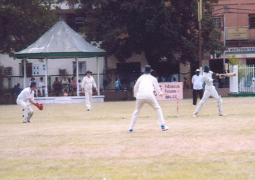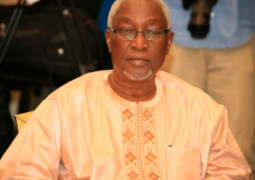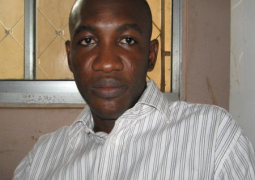Hanging on the balance of probabilities
PDOIS was waiting for the communiqué of the extraordinary meeting of the ECOWAS Authority to draw our own conclusions on the way forward to address the crisis of Governance in
LAURENT GBAGBO’S GOVERNMENT NO MORE AND ALASANA OUATTARA’S GOVERNMENT NOT YET
The situation in
Elections, with all the imperfections, are the best tool known in the twenty first century which could be relied on to determine the legitimacy of a Government in a
Cote D´Ivoire had its first round of elections on 31st October 2010. All the Candidates ultimately accepted the verdict of the Independent Electoral Commission. It was very clear from the first round that the votes in the second round would be close. Hence both contestants should have been ready to accept the results and further envisage a slim margin of victory that should be accepted in good faith to facilitate a smooth assumption of political office. Now
THE BIRTH OF THE CURRENT SITUATION
History teaches us that after the coup of 1999 a government of National Unity was formed by General Guei, a new constitution was drafted and elections were scheduled for 2000. Bedie and Ouattara, two leading contenders were disqualified.
Hence the election was reduced to a contest between General Guei and Laurent Gbagbo. The trend towards victory by Gbagbo motivated General Guei to disband the Electoral Commission before the completion of the counting of votes and declared himself winner. This compelled Gbagbo’s supporters to take to the street and their support by many gendarmes and soldiers forced Guei to flee. Having gained the most votes, Gbagbo was declared President. Gbagbo should not forget this history but should draw lessons from it.
Ouattara supporters then took to the street and called for new elections while denouncing the decision of the Supreme Court which rendered their candidate ineligible to participate in the elections. The youths and the armed forces loyal to Gbagbo suppressed the demonstrators resulting in hundreds of deaths and immense destruction of property. Civil war was delayed only because Alassane Ouattara decided to concede to the presidency of Gbagbo in the interest of peace. Since then
The rebellion, led by forces loyal to General Guei which aimed to overthrow Gbagbo in September 2002, led to the death of Robert Guei and the beginning of the fragmentation of the country on southern and Northern frontiers.
Attempts at promoting reconciliation gave rise to the convening of meetings between the country’s major political parties and the armed opposition. January 2003 witnessed the signing of the Linas-Marcoussis Accord which was brokered by
The stakeholders agreed to share power and to solve the problem of national identity and the qualification of citizenship without which voter registration could not be properly done.
Suffice it to say that, vacillation in the implementation of the accord gave rise to an impasse and further negotiations. These negotiations gave rise to the July 30th Accra Agreement of 2004 and the Pretoria Agreement of 6th April 2005.
All the agreements had three fundamental objectives which should be noted by all those who are interested in addressing the current impasse.
The first objective was to eradicate the basis for an armed opposition and create an environment conducive to the establishment of a genuine National Army that would be loyal to civil authority through disarmament, demobilization, and reintegration of all forces into the national armed and security forces.
The second objective was to ensure the proper identification of citizens and the issuing of birth and Nationality certificates to facilitate the registration of voters.
The third objective was to create an environment conducive for the holding of free and fair elections through the establishment of a credible Independent Electoral Commission.
These objectives could not be attained before the scheduled election date of 30 October 2005. Hence in September 2005, the Government announced the postponement of the election
CRISIS OF LEGITIMACY
Gbagbo’s Government could not attain legitimacy after the expiration of its term without convening fresh elections. In the absence of legitimacy a government would not be able to conduct international relations with other countries or multilateral institutions. Legitimacy had to be derived from Agreements endorsed by ECOWAS, The African Union and the United Nations.
History teaches that this is precisely how the Regional institutions and the United Nations came to be stakeholders in
One could say without fear of exaggeration that
Initiatives were taken between October 2005 and October 2006 to start Pilot identification programmes to enable people to receive Nationality documents and regroup combatants in preparation for disarmament.
Suffice it to say that neither initiative was completed before the scheduled date of the elections in 2006. In order to give legitimacy to his Presidency and prevent armed uprising when it became clear that elections could not take place in 2006 as planned, President Gbagbo called for direct talks with the New Forces and the elimination of the Zone of Confidence which was created to separate the Southern forces from the Northern forces which were all backed by militias. This surprise move to convert enemies into friends and distrusted neighbours into mediators changed the whole character of the conflict in Cote D´ivoire and set the foundation for the birth of a new Ivorian Nation which is still hanging on the balance of probabilities. This move by Gbagbo gave birth to the Ouagadougou Political Agreement of 4th March 2007.
A VIABLE STRATEGIC MOVE BY GBAGBO
The Ouagadougou Agreement is what made the 31 October 2010 election possible, the first relatively free and fair election in Ivorian history. Gbagbo has been in office for ten years. If he maintained the same spirit of reconciliation and national unification which gave birth to the Ouagadougou agreement which enabled him to work with Soro as Prime Minister and concede to a peaceful transition of political office, he would have earned himself the title of being the founder of a modern democratic multi ethno linguistic state of Cote d’Ivoire. A standard would have been set to be followed by any subsequent government. That record is hanging on a balance.
It goes without saying that the
A new transitional government led by Soro of the New Forces, came into being at the end of March and a new Cabinet was formed. In order to promote National reconciliation and reunification the rebel and government forces formed an Integrated Command Centre which was mandated to restructure the defence and security forces. They were also to foster the reintegration of former combatants into the National Army and the disarmament and demobilisation of non state forces.
Furthermore, the identification of Nationals and the issuing of identity papers were to be speeded up in order to fast track the registration of voters so that election could take place within ten months.
In September 2007, the first step in identifying the sovereign Ivorian citizens who should be the depository of the Sovereignty of the Ivorian Nation was taken when mobile courts began to issue birth certificates to people who never dreamt of having National Identity papers.
Peace also followed such an exercise. Hence, few were disturbed when the government continued to announce postponement of the elections on many occasions. The stakeholders simply signed supplementary agreements to the Ouagadougou Political Agreement to give legitimacy to the Government. Peaceful coexistence of political forces gave rise to the reunification of the Nation and the consolidation of its internal and external sovereignty and territorial Integrity.
The Identification and registration of Nationals for registration as voters, which was conducted nationwide in December 2008 restored the confidence that credible elections could be held to safeguard the Sovereignty of the people.
The failure to complete the registration exercise in 2009 led to the postponement of the elections scheduled for 29 November 2009 by the Independent Electoral Commission.
The last phase came when the IEC and the Cabinet were dissolved on 12 February 2010. The negotiations which followed for the appointment of a new cabinet and a new head of the IEC confirm that
The Sovereignty of the people was fully restored when the elections were scheduled for 31 October 2010 and campaign started to appeal for their support.\
PRELUDE TO THE CURRENT CRISIS
The people turned out in their large numbers to vote in order to assert their sovereignty on 31st October 2010. Official results had it that Gbagbo won the first round with 38 percent of the votes, Ouattara had 32 percent and Bédié had 25 percent. The Independent Electoral Commission declared the results and the Constitutional Council announced the official results and confirmed Gbagbo’s first round victory.. Appeals for recounts were not entertained. Eventually, all stakeholders accepted the results of the election.
The UN representative, Y. J. Choi said the electoral process during the first round held on 31 October was peaceful and democratic, fair and transparent. He added that the anomalies, irregularities and errors were minor and did not affect, in a significant way, the overall results of the elections.
The second round was thus slated for 28 November 2010. It started with debates that are considered unique in political circles in
The coalition of parties which supported Ouattara claimed that he received over 80 percent of the votes from supporters of former president Henri Konan Bedie, who gathered 25 percent in the first round held on Oct. 31. They concurred with the results announced by the IEC.
The headquarters of Gbagbo’s campaigns called for the “cancellation” of results from the north, especially from Seguela, Korhogo and Odienne regions, claiming that the voting exercise in these areas was not fair.
The Electoral Commission is legally obliged to declare the provisional results within three days. It had to declare the results by the end of Wednesday Ist December and have them confirmed by the Constitutional Council.
The whole world waited for the results only to witness a dramatic announcement made by the head of the Independent electoral commission that Ouattara is the winner, having received 54.1 percent of the votes cast to Gbagbo’s 45.9 percent. The Constitutional Council cancelled the results from regions in the North and confirmed that Gbagbo was the winner of the elections.
Gbagbo decided to rely on the pronouncement of the Constitutional Council to swear himself in as President. Ouattara also relied on the declaration of the Independent Electoral Commission to declare himself President.
THE NATURE OF THE CRISIS
A Constitutional and Institutional crisis has now become the order of the day. The problem in
divide. Coalitions are behind both Gbagbo and Ouattara comprising people from the North and South. The problem is not one of Sovereignty of the Ivorian state. No one is saying that Cote d’Ivoire should be governed by any one who is not elected by the Ivorian people, who are the depositories of the sovereignty of the Nation
The problem in Cote d’Ivoire is how to affirm the sovereignty of the people. This can only be done by allowing the people to vote freely and respect the results. This should be made possible by Constitutions and Institutions. The problem in
general.
What is important now is to move from ultimatums and employ crisis management and resolution strategies to resolve the problems.
Gbagbo should recognise that he has been a President for five years without the mandate of the Ivorian people. The elections are designed to restore the sovereignty of the Ivorian people and restore government by constitutional mandate and not one by agreements and consensus as has been the case.
The mediators should make it very clear that only the Ivorian people have the right to determine who should govern their country and they have no other aim but to support the Ivorian people to affirm their will through the ballot. It should be clear to the Ivorian people that their institutions have not spoken with one voice and that fact is the source of the crisis. It should be made clear that both voices cannot be correct. One statement must be the truth and the other must be a farce.
It should be clear to the Ivorian people that ECOWAS; the AU and the UN are simply interested in the truth so that the votes of the Ivorian people will determine who runs
The second point is to create the mechanism to address the Constitutional and Institutional crisis. The UN should appoint Kofi Annan, AU should appoint Konare and ECOWAS should appoint Kabba to start the process of addressing the crises. A meeting should be held in a country of their choice attended by representatives of Ouattara, Gbagbo, The President of the Independent Electoral Commission, The President of the Constitutional Council, representatives of ECOWAS, AU and the UN, The President of the Ivorian Parliament and Constitutional experts to review how to constitutionally revoke the decision of the Constitutional Council and restore the Provisional results of the Independent Electoral Commission. The current members of the Constitutional Council have compromised their
therefore be convinced to resign and persons acceptable to all sides appointed to review the results submitted by the Independent Electoral Commission so that constitutionality would be restored. Since
In the interim, both Presidents would revoke their status as Presidents and dissolve their cabinets and agree to the constituting of a caretaker government that is acceptable to both sides to oversee the Country pending the review of the Provisional results by a newly constituted
Every country has internal and external sovereignty. Gbagbo cannot defend the external sovereignty of
Neither the Fanning of Narrow Nationalist and National Chauvinist sentiments nor the perpetuation of ethno linguistic prejudices could enable Gbagbo to have the capacity to defend the external sovereignty of




